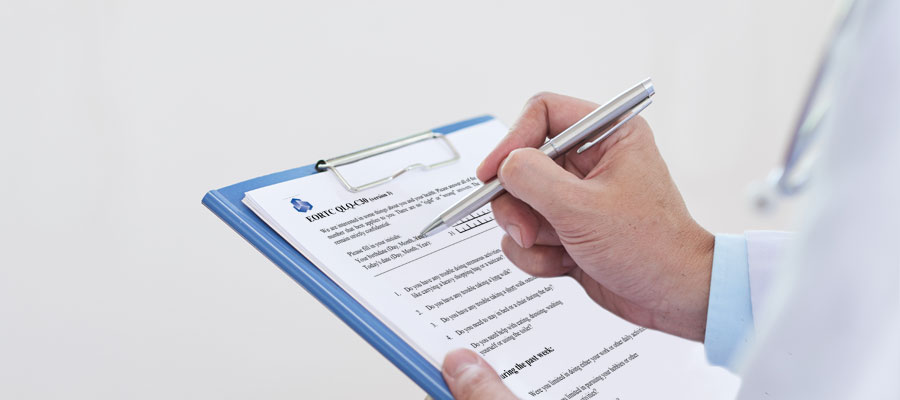Concepts assessed in the EORTC QLQ-C30 questionnaire are important and relevant for patients with cancer
25 Nov 2022
Brussels, 25th November 2022: A brand new research study by Kim Cocks et al.1 has been published in the European Journal of Cancer. This important paper demonstrates the continued importance and relevance of the European Organisation for Research and Treatment of Cancer (EORTC) QLQ-C30 core questionnaire for patients with cancer.
Originally published in 1993, the EORTC QLQ-C30 is among the most widely-used patient-reported outcome measures in cancer research and clinical practice. Designed to assess the quality of life of patients with cancer, it has been translated in over 120 languages as well as used in more than 5,000 studies and cited in over 15,000 papers worldwide.
About the study by Cocks et al.
As part of this study, interviews with 113 patients with a range of cancer types and disease stages and from across Europe and the USA were conducted between 2016 and 2020. The patients were asked about their disease and treatment-related symptoms and how those symptoms impact their lives. The purpose of this qualitative interview study was to ensure the concepts assessed by the questions in the QLQ-C30 are still important and relevant to patients today, despite the many advances in cancer treatments since the questionnaire was originally developed.
QLQ-C30 questions are important and relevant for patients and widely understood
The study showed that the concepts included in the QLQ-C30 questionnaire are appropriate and relevant to patients across cancer types and disease stages. Importantly, and as highlighted by lead author Kim Cocks, Senior Director, Patient-Centered Outcomes, Adelphi Values, “We wanted to ensure that the questionnaire was not missing any key symptoms or side effects from more novel treatments or due to being treated with different combinations of drugs and experiencing multiple lines of treatment. One of the things we asked patients was if anything important was missing from the questionnaire. Only a few concepts were mentioned at all, and even those concepts were each identified by no more than four patients out of the sample of 113, supporting the continued use of the QLQ-C30 without revision.”
The use of patient-reported outcome measures such as the QLQ-C30 in oncology clinical trials is well-established. This study further demonstrates the utility of the QLQ-C30 for enhancing clinical practice and capturing patients’ experiences of cancer and related treatment. Andrew Bottomley, co-author and Assistant Director and Head of the EORTC Quality of Life Department said: “This paper clearly shows that patients themselves consider the EORTC QLQ-C30 highly relevant to them and that it is well suited as an outcome tool to evaluate their quality of life”. In order to fully assess symptoms and/or key functional impacts from specific cancer types or more novel treatments, the EORTC measurement model recommends using the QLQ-C30 alongside supplementary disease-specific questionnaires (modules) or questions from the Item Library.
About the Quality of Life Group
The Quality of Life Group (QLG) strives to improve health-related quality of life (HRQoL) of cancer patients, through dedicated research and the use of HRQoL measures within cancer clinical trials and clinical practice. HRQoL constitutes an important aspect of cancer research and care: it gives a voice to patients, putting their experience at the forefront. The QLG is part of the European Organisation for Research and Treatment of Cancer (EORTC).
For further information, please visit the QLG website: qol.eortc.org
About EORTC
The European Organisation for Research and Treatment of Cancer (EORTC) is a non-governmental, non-profit organisation, which unites clinical cancer research experts, throughout Europe, to define better treatments for cancer patients to prolong survival and improve quality of life. Spanning from translational to large, prospective, multi-centre, phase III clinical trials that evaluate new therapies and treatment strategies as well as patient quality of life, its activities are coordinated from EORTC Headquarters, a unique international clinical research infrastructure, based in Brussels, Belgium.
For further information, please visit the EORTC website: www.eortc.org
About Adelphi Values
Adelphi Values is a leading health outcomes consultancy that works with a wide range of pharmaceutical companies. The Patient-Centered Outcomes team support the selection, development and validation of clinical outcome assessment measures for evaluation of the patient experience and assessment of treatment benefit. Our purpose is to improve patients’ lives by informing healthcare decisions.
For further information, please visit: www.adelphivalues.com
Contact
Caroline Hance (EORTC QLG)
caroline.hance@eortc.org
1 Kim Cocks, Jane R. Wells, Colin Johnson, Heike Schmidt, Michael Koller, Simone Oerlemans, Galina Velikova, Monica Pinto, Krzysztof A. Tomaszewski, Neil K. Aaronson, Elizabeth Exall, Chelsea Finbow, Deborah Fitzsimmons, Laura Grant, Mogens Groenvold, Chloe Tolley, Sally Wheelwright, Andrew Bottomley, Content validity of the European Organisation for Research and Treatment of Cancer Quality of Life Questionnaire QLQ-C30 for use in Cancer, European Journal of Cancer, Volume 178, 2023, Pages 128-138, ISSN 0959-8049, https://doi.org/10.1016/j.ejca.2022.10.026.
(https://www.sciencedirect.com/science/article/pii/S0959804922013296)
Related News
Meet the new EORTC Board
9 Jul 2024
We are pleased to announce the release of the EORTC 2023 Annual Report
17 Jun 2024
Dr Denis Lacombe, EORTC CEO, appointed stakeholder co-chair of ACT EU advisory group
24 May 2024
Clinical Trials Day 2024: a Q&A on pragmatic clinical trials
20 May 2024
EORTC/EMA workshop suggests an international way forward for treatment optimisation studies
8 May 2024
EORTC’s Participation at the ESTRO Congress 2024
29 Apr 2024
EORTC: Advancing research and treatment for rare cancers
29 Feb 2024
EORTC Fellowship Programme: celebrating more than 20 years of impactful collaboration
22 Feb 2024
Appointment of Malte Peters as EORTC Strategic Alliance Officer
9 Feb 2024
Unique series of workshops in partnership with the European Medicines Agency (EMA)
7 Feb 2024


